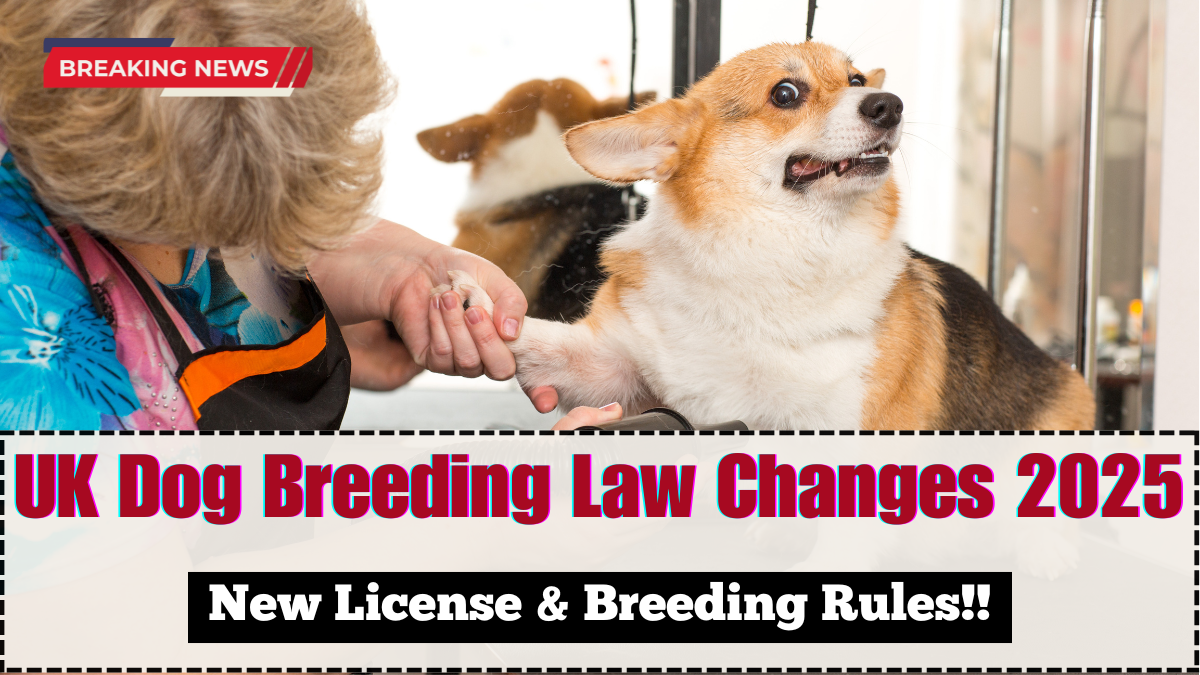The UK government has officially introduced stricter pet breeding regulations, and the UK Dog Breeding Law Changes 2025 are now in full effect. These new legal standards are aimed at improving animal welfare, ensuring safe breeding practices, and reducing the rise in illegal or unethical breeding across the country.
As pet ownership continues to rise, especially among families and young professionals, the number of dog breeders in the UK has also surged. This boom, however, brought increased scrutiny around puppy farms, overbreeding, and inadequate living conditions for dogs. That’s why the dog breeding 2025 legislation has become essential to both professional breeders and first-time dog owners.
Let’s take a detailed look at what the new UK breeder law says, how it affects dog breeders, and what steps you need to take to stay compliant in 2025.

Key Changes Introduced in 2025
The updated legislation significantly revises earlier breeding guidelines and licensing systems. The key points under UK Dog Breeding Law Changes 2025 include:
-
New Licensing Threshold: Any individual breeding more than one litter per year must now apply for a breeder’s license.
-
Maximum Litters Rule: A single female dog may not be bred more than three times in her lifetime.
-
Mandatory Health Screening: All breeding dogs must undergo certified health and genetic testing.
-
Microchipping at Birth: All puppies must be microchipped and registered before leaving the breeder’s premises.
-
Stricter Inspections: Local authorities are empowered to conduct unannounced visits and penalize violations.
-
Puppy Sales Restrictions: Puppies must be sold directly to new owners—third-party sales or pet shop resales are strictly prohibited.
These new rules are part of the wider 2025 campaign to reinforce responsible breeding and reduce animal cruelty across the UK.
New Licensing Requirements for Breeders
Previously, a license was required only if a breeder had three or more litters a year. Under the dog breeding 2025 law, even one litter annually can require licensing depending on whether the breeder advertises or sells puppies.
To be eligible for a license, breeders must now:
-
Complete an Animal Welfare Assessment by their local council
-
Provide proof of suitable housing, feeding routines, and regular veterinary care
-
Display clean record of compliance from previous inspections
-
Show proof of parent dogs’ health screening results
-
Undergo annual renewal reviews (some high-standard breeders may qualify for 3-year licenses)
Breeders will be graded (1 to 5 stars), affecting the length and cost of their licenses. The changes are designed to weed out irresponsible breeders and promote best practices in the UK breeder law system.
Impact on Small Breeders and Pet Owners
The new rules affect not only commercial breeders but also individuals who breed dogs occasionally. Many hobby breeders may now fall under regulation and need to obtain a license to stay legal in 2025.
For small-scale breeders:
-
They must keep detailed breeding records.
-
Maintain hygienic, stress-free environments for their dogs.
-
Avoid breeding dogs that are too young or too old.
-
Comply with veterinary care standards.
For pet buyers:
-
Always ask to see the breeder’s license.
-
Request health and vaccination documents for the puppy.
-
Visit the premises to ensure animals are raised in healthy conditions.
These safeguards are part of the UK’s plan to regulate dog breeding and reduce the strain on shelters and rescue groups.
Penalties for Non-Compliance
Authorities have warned that penalties under the UK Dog Breeding Law Changes 2025 will be severe to ensure maximum compliance:
-
Unlicensed breeding: Up to £5,000 in fines and potential imprisonment
-
False advertising: Strict action against those disguising as “private sellers”
-
Neglect or cruelty: Banned from owning pets or breeding in the future
-
Overbreeding: Heavy fines for breeding females beyond the allowed limit
Local councils are actively monitoring online listings and using data analytics to trace back illegal breeders. If you’re operating as a breeder in 2025, now is the time to ensure full compliance with pet regulations.
FAQs
What is the main change in UK Dog Breeding Law Changes 2025?
The most important change is that even breeders producing just one litter per year may now need to get licensed, depending on their sales and advertising.
How many litters can a female dog have legally?
The new rules allow a maximum of three litters per female dog during her lifetime, to protect animal health and prevent exploitation.
Are unlicensed breeders still selling puppies?
Authorities are actively cracking down on unlicensed sellers. If caught, individuals face fines, bans, and possible criminal charges.
What documents should a licensed breeder provide?
Buyers should receive a license number, health screening reports, vaccination records, and microchip registration details.
Are pet shops allowed to sell puppies in 2025?
No, pet shops or third parties are prohibited from selling puppies. Only direct breeder-to-owner sales are permitted.
Click here to know more.
